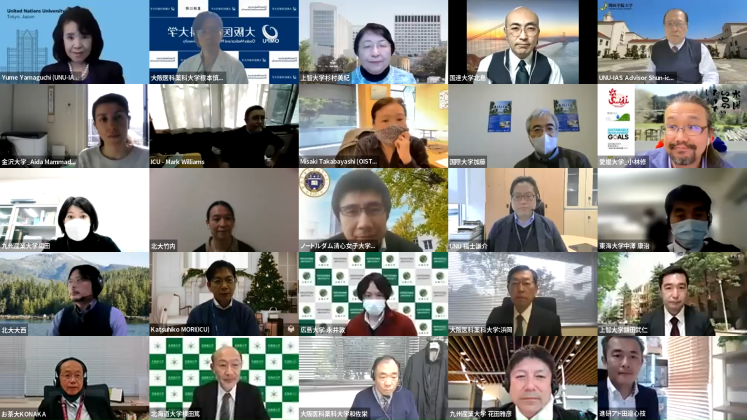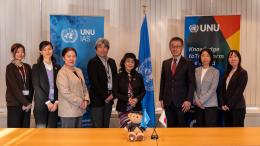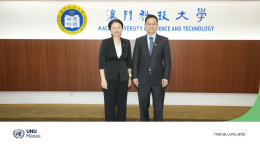On 14 December 2021, UNU-IAS organised the 13th workshop and the third working group session of the SDG–Universities Platform (SDG–UP). The online event engaged 51 participants from 23 universities across Japan, in discussions by four working groups that followed up on the previous session.
Working Group on SDGs Curriculum
The group has been producing course materials comprising 15 lecture videos. Several participating universities plan to use the materials in their curriculums from April 2022, and UNU-IAS aims to develop them into a UNU-IAS Certificate Programme in future. The course materials will be presented in an SDG–UP symposium scheduled for 30 March 2022.
Working Group on University Evaluation and Accountability
The Sustainability Promotion Division of Sophia University presented the results of a survey it had conducted on efforts by the world’s top five universities to achieve the SDGs. It was also reported that 14 universities had responded to an SDG–UP participant questionnaire and that there were requests to further clarify the questions and the evaluation process. Two examples of best practice by member universities will be presented in the symposium on 30 March.
Working Group on University Collaboration
The group agreed on the need to create a collection of case studies, web pages, and an open access database to promote collaboration between participants. Recognising the pioneering role of the 32 member universities, the group called for more universities to be involved in the project and develop partnerships with companies and local governments in Japan and other countries. The symposium on 30 March will feature a panel discussion to further develop inter-university collaboration, focusing on efforts to promote the SDGs from a Japanese perspective.
Working Group on Management
Based on discussions in the previous sessions, each university presented its efforts to achieve the SDGs and promote sustainability from a management perspective. In the symposium on 30 March, members will develop and present a list of actionable items reflecting each university's environment, size, and structure.
Shunichi Murata (SDG–UP Advisor; Professor, School of Policy Studies, Kwansei Gakuin University) remarked that the platform was action-oriented and progressing at a fast pace. He noted that the working group on SDGs curriculum had developed teaching materials through an exceptional joint effort by 12 universities, and emphasised that the other working groups were also making remarkable progress. Prof. Murata concluded that the working groups had produced valuable strategies for inter-university collaboration.
In closing, Shinobu Yume Yamaguchi (Director, UNU-IAS) shared plans to present SDG–UP activities at several international conferences between April and June 2022. She commended the fast pace of discussions based on the first year's recommendations and stressed that discussions on more specific measures would be held in the symposium on 30 March. She concluded the session by encouraging the working groups to proactively share their ideas.
A detailed report on the event is available in Japanese.
Participating Universities
This workshop engaged 23 participating universities, which are listed below in alphabetical order.
Ehime University
Hiroshima University
Hokkaido University
International Christian University
International University of Japan
Kanagawa University
Kanazawa University
Keio Gijuku University
Kwanseigakuin University
Kyushu Sangyo University
Kyushu University
Notre Dame Seishin University
Ochanomizu University
Okinawa Institute of Science and Technology
Osaka Medical and Pharmaceutical University
Osaka Metropolitan University
Osaka University
Sophia University
Tokai University
Tokyo City University
Tokyo Institute of Technology
Toyo University
University of Tsukuba





